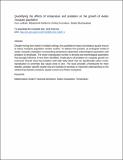| dc.contributor.author | Lusekelo, Eva | |
| dc.contributor.author | Helikumi, Mlyashimbi | |
| dc.contributor.author | Kuznetsov, Dmitry | |
| dc.contributor.author | Mushayabasa, Steady | |
| dc.date.accessioned | 2023-03-02T08:50:46Z | |
| dc.date.available | 2023-03-02T08:50:46Z | |
| dc.date.issued | 2023-01-10 | |
| dc.identifier.uri | http://dx.doi.org/10.1007/s40808-022-01687-x | |
| dc.identifier.uri | https://dspace.nm-aist.ac.tz/handle/20.500.12479/1819 | |
| dc.description | This research article was published by Springer Nature, 2023 | en_US |
| dc.description.abstract | Despite having been tested in multiple settings, the quantitative impact of predatory aquatic insects to reduce mosquito population remains unclear. To address this question, an ecological model of Aedes mosquito population incorporating temperature-dependent entomological parameters and predation is developed. The vector reproduction number is derived and entomological parameters that strongly influence it have been identified. Implications of predation on mosquito growth are examined. Results show that predators with high daily attack rate can significantly reduce vector reproduction to extremely low values close to zero. The study provides a framework for more detailed, predator specific studies that are essential to develop an improved understanding on the relationship between predatory aquatic insects and Aedes mosquitoes. | en_US |
| dc.language.iso | en | en_US |
| dc.publisher | Springer Nature | en_US |
| dc.subject | Mathematical model | en_US |
| dc.subject | Fractional derivative | en_US |
| dc.subject | Aedes mosquitoes | en_US |
| dc.subject | Temperature | en_US |
| dc.title | Quantifying the effects of temperature and predation on the growth of Aedes mosquito population | en_US |
| dc.type | Article | en_US |

